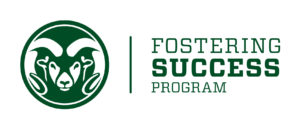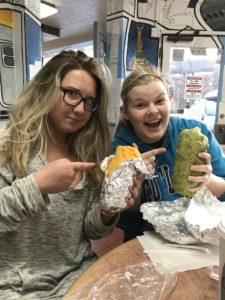New peer mentoring program created as part of Fostering Success
Article by Drew Smith. Originally published on Source.
A new mentoring program has been formed for CSU students who were foster youth or otherwise separated from their parents.
The Fostering Success Program was started at CSU in 2010 for students from independent backgrounds. This includes students from foster care, students who have emancipated, students in kinship care, unaccompanied homeless students and any student with a lack of parental support.
The program initially began with volunteer work from a couple of graduate students and staff who recognized a need to support students from independent backgrounds. At the time, the program began providing care packages to the handful of students on campus who identified as former foster youth.
Since then the program has expanded significantly and is currently serving over 200 students from a variety of independent backgrounds. In February of this year, Fostering Success was able to hire its first full-time administrator, Andrea Fortney.
On average, college students rely on parental support until they are 26 years old. The Fostering Success Program aims to fill this void of emotional and financial support that this group of students may be experiencing. Even though these students may have built support networks through other family members or parent-like figures, the program offers an additional layer of support.
For Fostering Success students, the program provides several services, including scholarships, family dinners, life planning, an on-campus pocket food pantry and other programs that can aid students in need.
“We want our students to succeed, and we do everything we can to supplement support that they may be missing,” said Fortney. “We just helped a student who suffered from a medical emergency and fell behind on rent; we were able to help the student cover those expenses.”
The breaks during the school year are one of the most challenging times for students in the program. Most students budget for the months that they are enrolled in school and may not have anywhere to return to while the university is closed.
“University Housing has really worked with us and the international student communities to keep housing options open for students,” Fortney said. “But the long winter and summer breaks can be difficult for students.”
Launch of the mentor program
This year, Fostering Success launched a mentorship program in which students who have previously used the program engage with incoming first-year and transfer students. This gives new CSU students from independent backgrounds a chance to interact with peers who are already familiar with campus resources and have been successful in their college career.
Educate Tomorrow, a national organization supporting coaching and mentoring for students from foster-care backgrounds, provides additional financial support for the mentoring program, including salaries for the mentors in the program. CSU currently has four mentors support groups of six to 10 first-year and transfer students in the program. Students will meet with their mentors in private sessions, participate in community engagement groups, and spend quality time together in various donor-funded activities.
“The mentoring program has been great for Fostering Success,” said Fortney. “The first year can be particularly difficult for our students, and when they are able to connect with someone in a similar situation, they are more motivated to continue with their education.”
Training
Mentors are well-trained on campus and community resources to help students find everything they might need. They are able to help students new to CSU with issues that include financial aid, mental health and food insecurity, and introduce them to programs the average student may not be aware of.
“One of the things that makes this program so successful is we don’t do it alone,” Fortney said. “Our students partner with several other organizations on campus, like the Key Communities, the Academic Advancement Center and C4E Programs. CSU knows how to embrace their students.”
One of the mentors, Melissa Henke, a senior who transferred to CSU in fall 2017, mentors many of the other transfer students in the Fostering Success Program.
“As a mentor, I really understand how valuable this program is because I wish I could have had a mentoring program like this my first year at CSU,” said Henke. “We as mentors have all had to go through the transitioning process into CSU, and when I meet new students we have an instant connection. I feel like it makes it easier for them to open up to another student like me who understands what it’s like to be an FSP student and who can offer effective, understanding support since I have been there myself.”
Fostering data
Two years ago, Associate Professor Tara Opsal in the Department of Sociology had heard of the Fostering Success Program and began attending meetings because she was interested in the organization and wanted to figure out how to be helpful. After participating in some meetings, she determined that it would be useful to collect data on the program and the students who were participating.
Opsal and a graduate student collected qualitative data by interviewing a host of students who participated in the Fostering Success Program. The interviews focused on students’ experience with the program and CSU, and on identifying the most important parts of the program.
“One of our major findings was that students reported that even knowing the program exists was one of their determining factors in attending CSU,” said Opsal. “Every student, regardless of how involved the students were with the program, felt a sense of belonging on campus because they have an organization that shows them they’re supposed to be here.”
Opsal’s findings confirmed that the mentorship program was a natural next step for Fostering Success. Students showed that they value connections made with other students in similar situations and maintaining those relationships as a piece of their support network.
“Fostering Success truly is an amazing grassroots organization that shows it just takes a few dedicated individuals with a great idea to improve hundreds of people’s lives,” said Opsal.
From Opsal’s M.A. student:
“I am so grateful to have had the opportunity to work with Dr. Opsal and the Fostering Success Program. It’s great to hear that the data we collected and analyzed is contributing to the continued success of the program,” says Rebecca Eman ’16. “The experience allowed me to grow my skills as a social scientist and to meet a wide variety of students. Interview after interview I walked away astonished; amazed at the incredible strength and perseverance of such strong and intelligent students.”